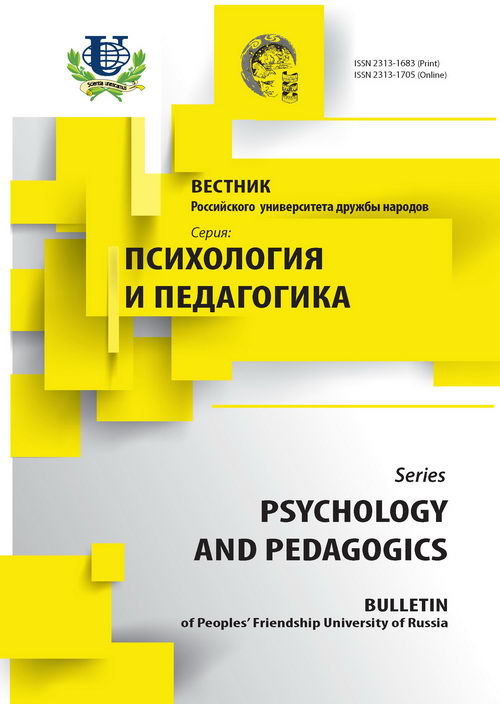No 4 (2008)
- Year: 2008
- Articles: 15
- URL: https://journals.rudn.ru/psychology-pedagogics/issue/view/497
Articles
From the editorial board
RUDN Journal of Psychology and Pedagogics. 2008;(4):5-6
 5-6
5-6


The Dependence of the Perception of the Individual-psychological Characteristics of a Person on the Morphotype of his Face
Abstract
The effect of the face shape on the perception of the personality is studied in the article. The photographs of men and women demonstrated at random were computer-manipulated to have a different type of face configuration, namely: square, rectangle, round, diamond-shaped and triangle. The analysis of variance revealed that the form of the face had a strong effect on the perception of some of the target personality characteristics and had no effect on the others.
RUDN Journal of Psychology and Pedagogics. 2008;(4):7-13
 7-13
7-13


Psychological Features of the Chinese Ethnos
Abstract
The article considers the factors that have generated the psychological characteristics of the Chinese and their psychological features, including the peculiarities of value orientations of the Chinese ethnos, the attitude of the Chinese to the various aspects of life, their general psychological features.
RUDN Journal of Psychology and Pedagogics. 2008;(4):14-21
 14-21
14-21


The Peculiarities of the Internal Position of Younger Schoolchildren with the Various Orientation of the Personality
Abstract
The article submits some psychological features of the internal position of younger schoolchildren with various orientations of the personality. The basic directions of psychological support of the internal position of the personality of younger schoolchildren are proved in the article.
RUDN Journal of Psychology and Pedagogics. 2008;(4):22-28
 22-28
22-28


Acmeological Principles, Determinants and Technologies of Development of Ecological Awareness of the Future Experts
Abstract
The acmeological approach as a core basis of the development of ecological awareness of the future experts is considered in the article, and in this connection the acmeological principles, determinants and technologies of the specified process are disclosed.
RUDN Journal of Psychology and Pedagogics. 2008;(4):29-35
 29-35
29-35


The Experience of Empirical Study of Students' Self-appraisal
Abstract
The results of the empirical study of self-appraisal of the students from different specialities, courses and departments of Tula State University and Tula State Pedagogical University named after L.N. Tolstoy are submitted in this article.
RUDN Journal of Psychology and Pedagogics. 2008;(4):36-41
 36-41
36-41


 42-46
42-46


 47-51
47-51


The System Approach to Studying Confidence of a Personality
Abstract
The approaches revealing the psychological essence of personality are presented in the article. Within the framework of consideration of the given approaches the study of the problem of psychology of confidence is traced through. The system approach to the investigation of confidence of the personality is separately analyzed, and the problematics connected with the psychological structure of this trait is regarded.
RUDN Journal of Psychology and Pedagogics. 2008;(4):52-57
 52-57
52-57


 58-62
58-62


Specifics of the Psychological Structure of the Responsibility of African and Latin American Students
Abstract
The correlation of the structure of the responsibility of African and Latin American students is analyzed in the article, disclosing the acute specifics of the psychological structure of the responsibility of the ethnic groups under consideration. It is revealed in the article, that the specifics of quantitative displays of the responsibility is shown most vividly in the cognitive and productive components of the structure, and also in the public values, such as socio-centricity, lack of urgency, sthenicity, internality, operational difficulties. The quantitative analysis of the responsibility of African and Latin American students shows, that the variables have the specificity both in the contansive, and in instrumental aspects. It is possible to believe, that the revealed distinctions are caused by the ethno-psychological features.
RUDN Journal of Psychology and Pedagogics. 2008;(4):63-68
 63-68
63-68


Formation of Ecological Culture of Young People within the Framework of Education for Steady Development
Abstract
The article deals with the questions of the education reform, the crisis of which is one of the challenges of globalization, it also offers a wide argumentation to the conclusion that the ecological education and the formation of ecological culture is the basis of education in the interests of steady development and the methodological base to the contents of education modernization in the frameworks of Bologna process.
RUDN Journal of Psychology and Pedagogics. 2008;(4):69-73
 69-73
69-73


Psychology-Pedagogical Conditions of the Formation of Spiritual-Moral Self-Actualization of a Person
Abstract
Psychological and pedagogical principles, methods and conditions of the development of spiritual-moral self-actualization of a person from a conventional stage in secular or religious-dogmatic forms to a post-conventional stage - the religious-humanistic form of spiritual-moral self-actualization of a person are considered in the article. The results of long-comparative researches of the features and general laws of the formation of spiritual-moral self-actualization of the personality of students in the framework of comprehensive education and in the innovative pedagogical system including the subjects aimed at developing spiritual-moral personality of the rising generation are submitted.
RUDN Journal of Psychology and Pedagogics. 2008;(4):74-78
 74-78
74-78


Interactive Learning Technologies to Build Students' Interest in Cross-Cultural Communication
Abstract
The article is devoted to the use of case-studies, group discussions, role-plays, imitative modeling and other interactive methods of teaching to build up students' interest in having communicative skills and socio-cultural knowledge necessary for effective cross-cultural communication.
RUDN Journal of Psychology and Pedagogics. 2008;(4):79-83
 79-83
79-83


Our autors
RUDN Journal of Psychology and Pedagogics. 2008;(4):84-85
 84-85
84-85
















